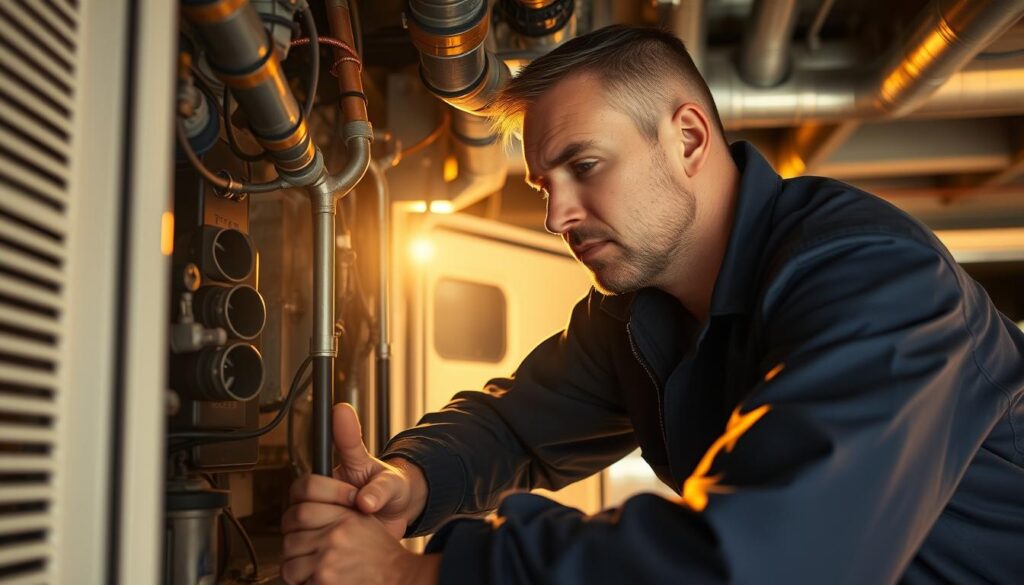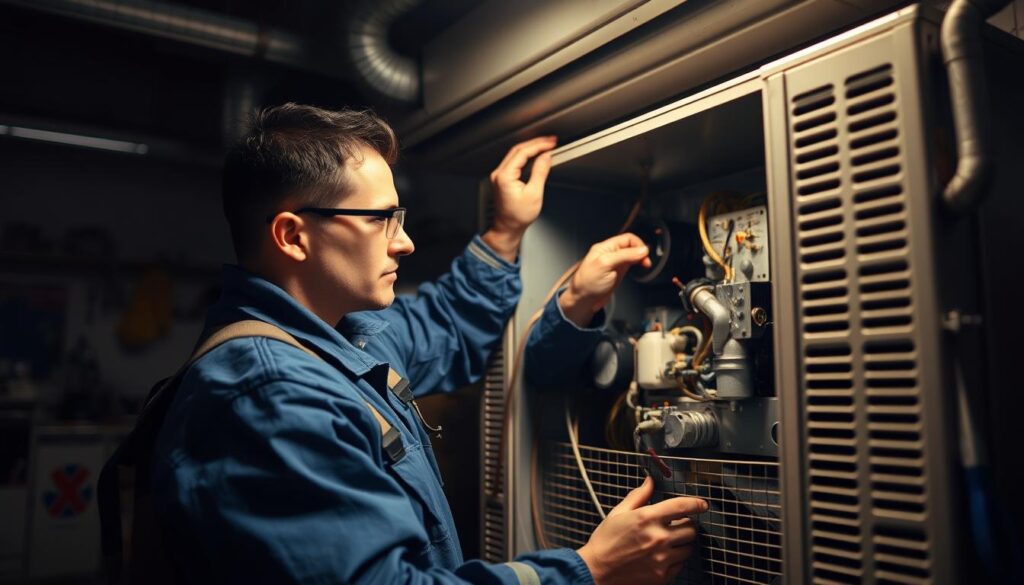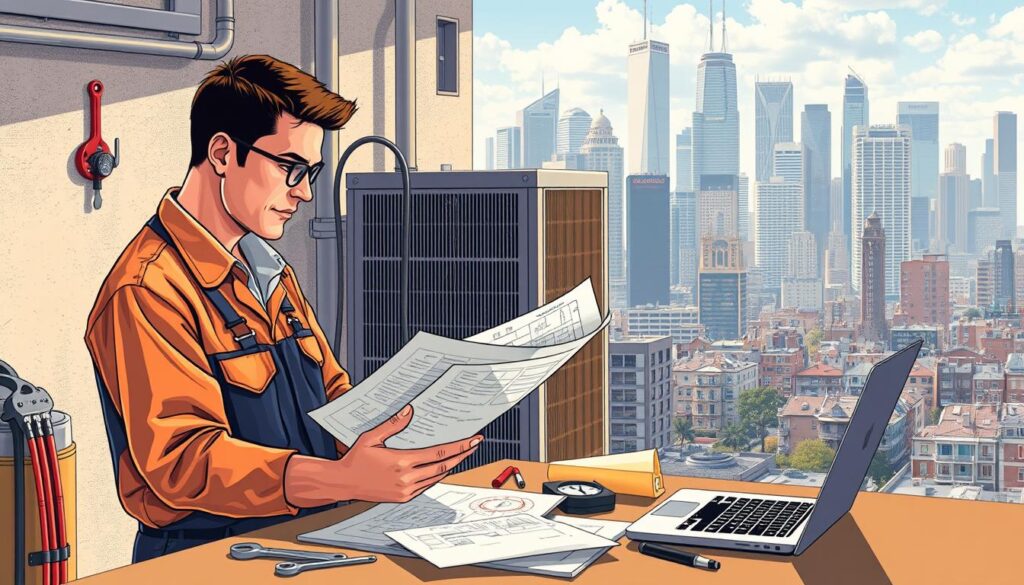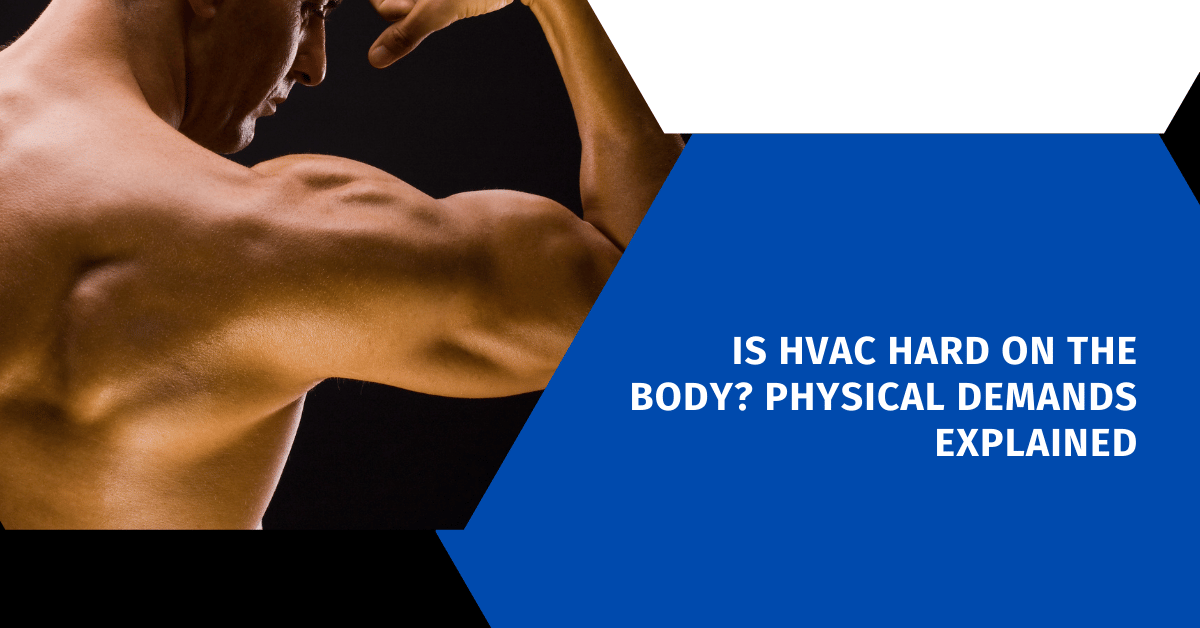Affiliate Disclosure
HVAC Guide Guys is a participant in the Amazon Services LLC Associates Program, an affiliate advertising program designed to provide a means for sites to earn advertising fees by advertising and linking to Amazon.
Is HVAC Hard on the Body? Ever wondered what it takes to keep buildings comfortable behind the scenes? Are you curious about how HVAC technicians truly experience their physically demanding profession?

HVAC technicians face unique physical challenges that go far beyond typical workplace expectations. They work with complex heating, ventilation, and air conditioning systems. This requires strength, agility, and endurance that many people don’t realize.
When exploring whether HVAC is hard on the body, it’s important to understand the physical demands these professionals face daily. They must crawl through tight spaces and lift heavy equipment. These tasks test the limits of human capability.
Each workday presents a series of physical challenges. These require technical skill and remarkable physical resilience. Understanding these demands can help aspiring technicians and current professionals maintain their health and safety.
Key Takeaways
- HVAC work involves significant physical exertion
- Technicians face diverse environmental challenges
- Physical fitness is key for long-term career success
- Proper safety equipment reduces body strain
- Regular training helps manage physical workplace demands
Table of Contents
Understanding the Physical Nature of HVAC Work
HVAC technicians face unique physical challenges. Their job is demanding but rewarding. They need to be very physically fit and strong.
HVAC work is much more than office jobs. Technicians must handle intense physical tasks. These tasks test their endurance and resilience.
Daily Physical Requirements
HVAC work includes many physically demanding tasks. These tasks can lead to injuries. Technicians often:
- Lift heavy equipment weighing 50-100 pounds
- Climb ladders and navigate tight spaces
- Work in challenging environmental conditions
- Stand and walk for long periods
Common Movement Patterns
The repetitive movements in HVAC work cause physical strain. Technicians often:
- Bend and twist while installing systems
- Reach into confined spaces
- Carry heavy tools and equipment
- Keep awkward body positions during repairs
Equipment Handling Demands
Handling HVAC equipment requires strength, precision, and technique. Technicians must manage tools and components. They need physical skill and careful maneuvering.
“HVAC work is as much a physical profession as it is a technical one.” – Industry Professional
Knowing these physical demands helps aspiring HVAC technicians prepare. They understand the rigorous nature of this essential trade.
Explore Our HVAC Shop
Looking for top-rated HVAC tools, parts, and accessories? Visit our shop and find the perfect solution for your needs.
Visit the ShopIs HVAC Hard on the Body: Common Physical Challenges
Working in HVAC can be tough on the body. HVAC technicians face many challenges that can affect their health. They deal with tight spaces, heavy equipment, and extreme temperatures.
HVAC ergonomic challenges show up in several ways:
- Repetitive motion strain from constant equipment handling
- Awkward body positioning in confined spaces
- Extreme temperature exposure
- Heavy lifting and equipment transport
The job can lead to health risks. Technicians often face tough environments like:
| Work Environment | Physical Challenge | Potential Health Impact |
|---|---|---|
| Attics | Extreme heat | Heat exhaustion |
| Crawl Spaces | Restricted movement | Muscle strain |
| Industrial Sites | Heavy equipment handling | Joint stress |
It’s important to protect your body in HVAC. Knowing these challenges helps technicians stay healthy. They can keep their bodies in top shape for a long HVAC career.
Key Physical Demands in Different HVAC Settings
HVAC jobs have different physical needs in various places. Your job as an HVAC tech will be unique in each setting. Knowing these physical demands helps you stay healthy and ready for your career.
The physical demands of HVAC work change a lot between homes, businesses, and factories. Each place has its own challenges that test your strength, flexibility, and how long you can keep going.
Residential Installation Strain
In homes, HVAC techs face tight spots and tough work. You’ll need to:
- Navigate narrow attics and crawl spaces
- Lift equipment that’s 50-100 pounds
- Work in uncomfortable spots for a long time
- Climb ladders and move around in homes
Commercial Project Challenges
Commercial HVAC work needs more strength. You’ll deal with bigger, heavier systems and:
- Stand and walk for a long time
- Place equipment exactly right
- Work high up
Industrial Work Physical Requirements
Industrial HVAC work is the toughest. You’ll face big challenges like:
- Dealing with huge industrial machines
- Working in very hot or cold places
- Wearing heavy safety gear
- Doing complex tasks
No matter where you work, HVAC jobs require you to be in top shape. You need to be strong and flexible. Understanding and preparing for these challenges is key to your success.
Explore Our HVAC Shop
Looking for top-rated HVAC tools, parts, and accessories? Visit our shop and find the perfect solution for your needs.
Visit the ShopHealth Risks and Safety Concerns in HVAC
HVAC technicians face many health risks on the job. These can affect their safety and well-being over time. It’s important to know these risks to stay safe and healthy at work.
The HVAC industry has many dangerous work environments. Technicians deal with several safety concerns. They need to pay close attention and take steps to prevent these issues.
- Electrical hazards that can cause serious injuries
- Chemical exposure from refrigerants and cleaning agents
- Physical strain from heavy equipment handling
- Potential respiratory risks from dust and toxic materials
Technicians might be exposed to harmful substances like chlorofluorocarbons (CFCs). These can harm your lungs and cause long-term health problems. Always wear the right protective gear.
| Health Risk Category | Potential Consequences | Recommended Prevention |
|---|---|---|
| Chemical Exposure | Respiratory issues, skin irritation | Use respirators, protective gloves |
| Electrical Hazards | Shock, burns, possible fatal injuries | Proper training, insulated tools |
| Physical Strain | Muscle injuries, joint stress | Ergonomic equipment, stretching |
To stay safe, follow strict safety rules, get regular health checks, and learn about job hazards. Invest in good protective gear and keep up with the latest safety tips for HVAC workers.
Long-Term Physical Effects of HVAC Work
HVAC technicians face big physical challenges that can harm their health over time. The job is tough, putting a lot of strain on the body. This can lead to health problems that show up years later.
It’s key for HVAC workers to know the long-term effects of their job. Their bodies are under constant stress from doing the same things over and over, lifting heavy, and working in tough places.
Joint and Muscle Impact
The job can really wear down your muscles and joints. HVAC workers often deal with:
- Chronic lower back pain from lifting heavy equipment
- Shoulder and knee joint deterioration
- Muscle fatigue and possible long-term tissue damage
Respiratory Considerations
Your lungs face special challenges in HVAC work. Being around dust, chemicals, and other harmful stuff for a long time can be risky for your health.
| Respiratory Risk Factors | Potential Long-Term Effects |
|---|---|
| Dust Exposure | Increased risk of respiratory infections |
| Chemical Interactions | Potential lung function reduction |
| Confined Space Work | Potential breathing complications |
Aging in the HVAC Field
As you get older in your HVAC career, the job gets harder. It’s more important than ever to take care of your health to keep doing well.
Workers should focus on their health, use the right safety gear, and use ergonomic methods. This can help lessen the long-term effects of HVAC work.
Preventing Body Strain and Injury

Preventing pain from HVAC work is key to staying healthy. HVAC technicians face many physical challenges. They need to protect themselves to keep working well.
Understanding where you might get hurt is the first step:
- Proper lifting techniques
- Stretching and flexibility exercises
- Ergonomic equipment usage
- Posture management
Here are some important ways to prevent pain:
- Bend at the knees when lifting heavy equipment
- Use mechanical assists whenever possible
- Maintain core strength through specific exercises
- Take regular breaks to prevent muscle fatigue
“Your physical health is your most important professional asset in the HVAC industry.” – Safety Expert Michael Rodriguez
Daily stretching can help a lot. Make a 10-15 minute routine for your muscles. Wear good shoes and use tools that are easy on your body.
Keeping your body safe is not just for now. It’s for a long, healthy career in HVAC. Use these tips to reduce the physical stress of your job.
Explore Our HVAC Shop
Looking for top-rated HVAC tools, parts, and accessories? Visit our shop and find the perfect solution for your needs.
Visit the ShopEssential Protective Equipment and Safety Measures
HVAC work injuries can be greatly reduced with good safety strategies. It’s important to wear the right protective gear and follow safety rules. This helps keep you safe from physical harm.
Your safety in HVAC depends on the right protective gear and knowing how to use it. To avoid injuries, always be proactive about protecting yourself.
Personal Protective Gear
Important personal protective equipment for HVAC techs includes:
- Safety glasses with side shields to prevent eye injuries
- Steel-toed work boots with slip-resistance
- Heavy-duty work gloves for hand protection
- Respiratory masks for dust and chemical exposure
- Hard hats in construction and industrial settings
Ergonomic Tools and Equipment
It’s key to reduce physical strain to avoid HVAC injuries. Ergonomic tools help lessen muscle and joint stress during tough jobs.
- Adjustable tool belts to distribute weight
- Lightweight equipment carriers
- Pneumatic lifting devices
- Anti-vibration gloves
Safety Protocols
Having strict safety rules can greatly lower workplace risks. Your employer should teach you about:
- Proper lifting techniques
- Equipment maintenance procedures
- Emergency response strategies
- Risk assessment before starting work
“Safety isn’t expensive, it’s priceless” – Unknown HVAC Professional
Protecting yourself is the first step in maintaining a long, healthy career in HVAC.
Career Longevity Strategies for HVAC Technicians

Managing the physical demands of an HVAC career is key. HVAC technicians can live longer in their careers by using smart strategies. These include reducing physical strain and improving skills.
Your career longevity depends on several key strategies:
- Continuous Skills Upgrading
- Strategic Career Specialization
- Physical Health Management
- Technology Adaptation
Choosing less physically demanding HVAC areas can help a lot. Think about focusing on:
| Specialization Area | Physical Demand Level | Career Potencial |
|---|---|---|
| HVAC Systems Control | Low | High |
| Energy Efficiency Consulting | Low | High |
| Smart Home Technology Integration | Low | High |
Getting professional education is vital for a long career. Make sure to get ongoing training. This will help you learn new tech and methods that are easier on your body.
“The most successful HVAC professionals are those who continuously adapt and learn.” – HVAC Industry Expert
Success in HVAC comes from balancing physical strength with tech skills. Take care of your health, keep up with trends, and plan your career wisely. This way, you’ll enjoy a fulfilling career for a long time.
Explore Our HVAC Shop
Looking for top-rated HVAC tools, parts, and accessories? Visit our shop and find the perfect solution for your needs.
Visit the ShopHealth Management Tips for HVAC Professionals
Preventing pain from HVAC work needs a proactive approach to your health. As an HVAC pro, your body faces a lot of strain every day. This makes managing your health key for a long career.
Your fitness is vital in avoiding pain from HVAC work. Keeping your body strong and flexible can greatly lower injury and pain risks.
- Develop a consistent exercise routine focused on core strength
- Practice stretching before and after work shifts
- Incorporate weight training to support muscle resilience
- Focus on cardiovascular endurance
Your diet also plays a big role in handling HVAC work’s physical demands. Your diet affects how well your body recovers and handles stress. Here are some diet tips:
- Eat foods high in protein for muscle repair
- Drink plenty of water all day
- Include anti-inflammatory foods like fish and leafy greens
- Try to avoid processed foods and sugar
“Your body is your most important tool in the HVAC profession. Treat it with care and respect.” – Professional HVAC Safety Advisor
Rest and recovery are key to avoiding HVAC work pain. Make sure to get good sleep, manage stress, and listen to your body. If pain lasts, see a health expert who knows about work-related health.
Conclusion
Is HVAC hard on the body? The answer is clear: it can be challenging, but not insurmountable. Your career in HVAC requires physical resilience, strategic preparation, and smart health management. By understanding the strain and implementing protective strategies, you can build a sustainable and rewarding career in this dynamic field.
The key to success lies in a proactive approach. Invest in proper training, use ergonomic equipment, and prioritize your physical well-being. Safety gear, regular exercise, and consistent health maintenance will help you minimize the physical toll of HVAC work. Professional technicians know that body awareness and preventative care are as important as technical skills.
Remember, HVAC work demands physical strength, but it also offers incredible opportunities for skilled professionals. Your ability to manage the job’s physical challenges will directly impact your long-term career satisfaction and health. With the right mindset, training, and self-care strategies, you can thrive in this essential and challenging profession.
Ultimately, is HVAC hard on the body? Yes, but with knowledge, preparation, and commitment, you can transform challenges into a successful and fulfilling career path. This path supports your professional growth and personal well-being.

